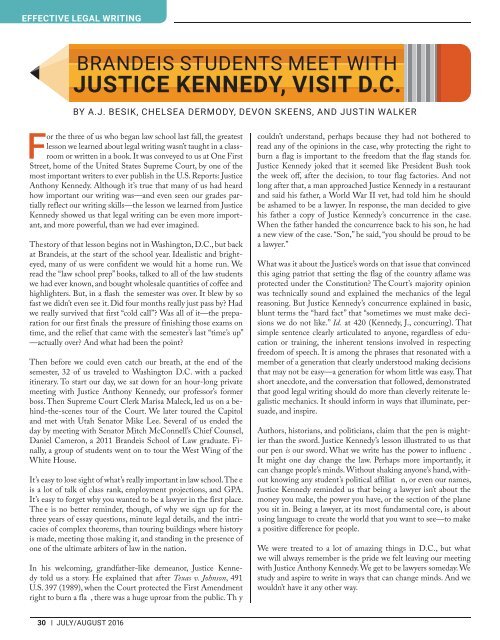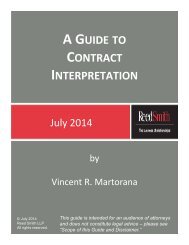you AND your spouse
BB_0716
BB_0716
Create successful ePaper yourself
Turn your PDF publications into a flip-book with our unique Google optimized e-Paper software.
EFFECTIVE LEGAL WRITING<br />
BR<strong>AND</strong>EIS STUDENTS MEET WITH<br />
JUSTICE KENNEDY, VISIT D.C.<br />
BY A.J. BESIK, CHELSEA DERMODY, DEVON SKEENS, <strong>AND</strong> JUSTIN WALKER<br />
For the three of us who began law school last fall, the greatest<br />
lesson we learned about legal writing wasn’t taught in a classroom<br />
or written in a book. It was conveyed to us at One First<br />
Street, home of the United States Supreme Court, by one of the<br />
most important writers to ever publish in the U.S. Reports: Justice<br />
Anthony Kennedy. Although it’s true that many of us had heard<br />
how important our writing was—and even seen our grades partially<br />
reflect our writing skills—the lesson we learned from Justice<br />
Kennedy showed us that legal writing can be even more important,<br />
and more powerful, than we had ever imagined.<br />
Thestory of that lesson begins not in Washington, D.C., but back<br />
at Brandeis, at the start of the school year. Idealistic and brighteyed,<br />
many of us were confident we would hit a home run. We<br />
read the “law school prep” books, talked to all of the law students<br />
we had ever known, and bought wholesale quantities of coffee and<br />
highlighters. But, in a flash the semester was over. It blew by so<br />
fast we didn’t even see it. Did four months really just pass by? Had<br />
we really survived that first “cold call”? Was all of it—the preparation<br />
for our first finals the pressure of finishing those exams on<br />
time, and the relief that came with the semester’s last “time’s up”<br />
—actually over? And what had been the point?<br />
Then before we could even catch our breath, at the end of the<br />
semester, 32 of us traveled to Washington D.C. with a packed<br />
itinerary. To start our day, we sat down for an hour-long private<br />
meeting with Justice Anthony Kennedy, our professor’s former<br />
boss. Then Supreme Court Clerk Marisa Maleck, led us on a behind-the-scenes<br />
tour of the Court. We later toured the Capitol<br />
and met with Utah Senator Mike Lee. Several of us ended the<br />
day by meeting with Senator Mitch McConnell’s Chief Counsel,<br />
Daniel Cameron, a 2011 Brandeis School of Law graduate. Finally,<br />
a group of students went on to tour the West Wing of the<br />
White House.<br />
It’s easy to lose sight of what’s really important in law school. The e<br />
is a lot of talk of class rank, employment projections, and GPA.<br />
It’s easy to forget why <strong>you</strong> wanted to be a lawyer in the first place.<br />
The e is no better reminder, though, of why we sign up for the<br />
three years of essay questions, minute legal details, and the intricacies<br />
of complex theorems, than touring buildings where history<br />
is made, meeting those making it, and standing in the presence of<br />
one of the ultimate arbiters of law in the nation.<br />
In his welcoming, grandfather-like demeanor, Justice Kennedy<br />
told us a story. He explained that after Texas v. Johnson, 491<br />
U.S. 397 (1989), when the Court protected the First Amendment<br />
right to burn a fla , there was a huge uproar from the public. Th y<br />
couldn’t understand, perhaps because they had not bothered to<br />
read any of the opinions in the case, why protecting the right to<br />
burn a flag is important to the freedom that the flag stands for.<br />
Justice Kennedy joked that it seemed like President Bush took<br />
the week off, after the decision, to tour flag factories. And not<br />
long after that, a man approached Justice Kennedy in a restaurant<br />
and said his father, a World War II vet, had told him he should<br />
be ashamed to be a lawyer. In response, the man decided to give<br />
his father a copy of Justice Kennedy’s concurrence in the case.<br />
When the father handed the concurrence back to his son, he had<br />
a new view of the case. “Son,” he said, “<strong>you</strong> should be proud to be<br />
a lawyer.”<br />
What was it about the Justice’s words on that issue that convinced<br />
this aging patriot that setting the flag of the country aflame was<br />
protected under the Constitution? The Court’s majority opinion<br />
was technically sound and explained the mechanics of the legal<br />
reasoning. But Justice Kennedy’s concurrence explained in basic,<br />
blunt terms the “hard fact” that “sometimes we must make decisions<br />
we do not like.” Id. at 420 (Kennedy, J., concurring). That<br />
simple sentence clearly articulated to anyone, regardless of education<br />
or training, the inherent tensions involved in respecting<br />
freedom of speech. It is among the phrases that resonated with a<br />
member of a generation that clearly understood making decisions<br />
that may not be easy—a generation for whom little was easy. That<br />
short anecdote, and the conversation that followed, demonstrated<br />
that good legal writing should do more than cleverly reiterate legalistic<br />
mechanics. It should inform in ways that illuminate, persuade,<br />
and inspire.<br />
Authors, historians, and politicians, claim that the pen is mightier<br />
than the sword. Justice Kennedy’s lesson illustrated to us that<br />
our pen is our sword. What we write has the power to influenc .<br />
It might one day change the law. Perhaps more importantly, it<br />
can change people’s minds. Without shaking anyone’s hand, without<br />
knowing any student’s political affiliat n, or even our names,<br />
Justice Kennedy reminded us that being a lawyer isn’t about the<br />
money <strong>you</strong> make, the power <strong>you</strong> have, or the section of the plane<br />
<strong>you</strong> sit in. Being a lawyer, at its most fundamental core, is about<br />
using language to create the world that <strong>you</strong> want to see—to make<br />
a positive difference for people.<br />
We were treated to a lot of amazing things in D.C., but what<br />
we will always remember is the pride we felt leaving our meeting<br />
with Justice Anthony Kennedy. We get to be lawyers someday. We<br />
study and aspire to write in ways that can change minds. And we<br />
wouldn’t have it any other way.<br />
30<br />
| JULY/AUGUST 2016



